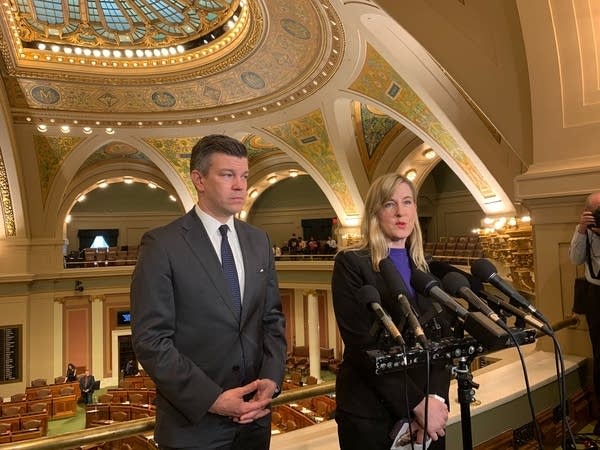Some cheer, some complain after extended legislative session finally ends

Go Deeper.
Create an account or log in to save stories.
Like this?
Thanks for liking this story! We have added it to a list of your favorite stories.
Updated: 9:13 a.m. | Posted: 4:03 a.m.
Gov. Tim Walz will act as soon as this week on a set of state budget bills the Legislature passed over the weekend. There is every indication he'll sign the package he helped negotiate ahead of the one-day special session that followed a five-month regular session.
Members of the Legislature quickly dispersed after adopting a two-year, $48 billion budget. It was messy, testy and, of course, tardy.
Turn Up Your Support
MPR News helps you turn down the noise and build shared understanding. Turn up your support for this public resource and keep trusted journalism accessible to all.
Still, Republican Senate Majority Leader Paul Gazelka said he's proud that even with a divided Legislature and governor of a different party, lawmakers made big strides.
"A new governor, a new speaker of the House and we were able to work together to pass very difficult budgets" Gazelka said after an all-nighter lawmakers needed to cross the finish line. "We were worlds apart but we figured out how to take care of the fundamentals."
Walz praised the budget as delivering on promises of investments in health care, education and community prosperity.
"Minnesota is showing the rest of the nation that Republicans and Democrats can still find compromise and work together to get things done," said Walz, a former congressman who pledged to cut through the gridlock so common in Washington when he took over the state's top job in January.

Never mind that the Legislature blew a week beyond a deadline for finishing up or that state leaders forged much of the agreement in private.
While the process was less than ideal, it's the product that matters more.
Minnesotans will see income tax cuts. Their schools will have an uptick in state aid even though some education leaders said inflation would take a big bite from the financial gain. And public assistance programs were largely preserved — or in the case of the poorest residents — enhanced.
Human Services Commissioner Tony Lourey choked up some when he reflected on the boost in cash assistance to people in the Minnesota Family Investment Program or Diversionary Work Program. It affects some 30,000 families.
"The first across-the-board increase in MFIP and Diversionary Work Program in over 33 years. We got $100 a month to every MFIP and DWP family in the state of Minnesota," Lourey said. "And that's a big deal. That's a really big deal."

For people worried about reports of fraud in public assistance programs, lawmakers agreed to step up investigations and crack down on abuse.
The budget is comprised of thousands of pages and hundreds of line items. The impact is large and small.
When it comes to filing taxes, DFL Rep. Paul Marquart said people will notice. The chair of the House Taxes Committee estimates that 92 percent of taxpayers will opt to take an enlarged standard deduction of $24,400 for married filers. That's combined with a quarter-percent drop in the rate of the second tier of the income tax.
"That is the first income tax rate cut since 2000. The first rate cut in 19 years. When you combine the standard deduction with that rate cut, on the average median family income that's a 7 percent income tax cut," Marquart said. "Very significant."
A 2 percent tax on medical procedures won't go away as scheduled, but it will drop to 1.8 percent.
Walz didn't get his phased-in, 20-cent increase to the gas tax to pay for road work, so any price changes at the pump won't be state government's fault.
Fees on various recreational activities and professional licenses will rise, but people will also catch some breaks. State parks will be admission-free four days a year instead of only one Open House day now.
Some people pressing matters before lawmakers saw their hopes dashed.
"Frustrated and lost, confused," is how Nicole Smith-Holt said the session left her.
Her son, Alec, died after rationing his insulin because he couldn't afford it, and became a face of the push for change. A proposal she championed to guarantee hardship access to insulin appeared well on track but got left out of the final package.
"The intent was to save someone's life in an emergency situation. Not for every Type 1 diabetic in Minnesota to rely on it for low-cost or free insulin."
But some lawmakers thought it went too far, although they did pass a measure allowing pharmacists to provide medication even if a person's prescription expires.
Smith-Holt said she'll regroup and ask lawmakers to revisit the issue next year when the Legislature returns for that 2020 session in mid-February.
Dear reader,
Political debates with family or friends can get heated. But what if there was a way to handle them better?
You can learn how to have civil political conversations with our new e-book!
Download our free e-book, Talking Sense: Have Hard Political Conversations, Better, and learn how to talk without the tension.



